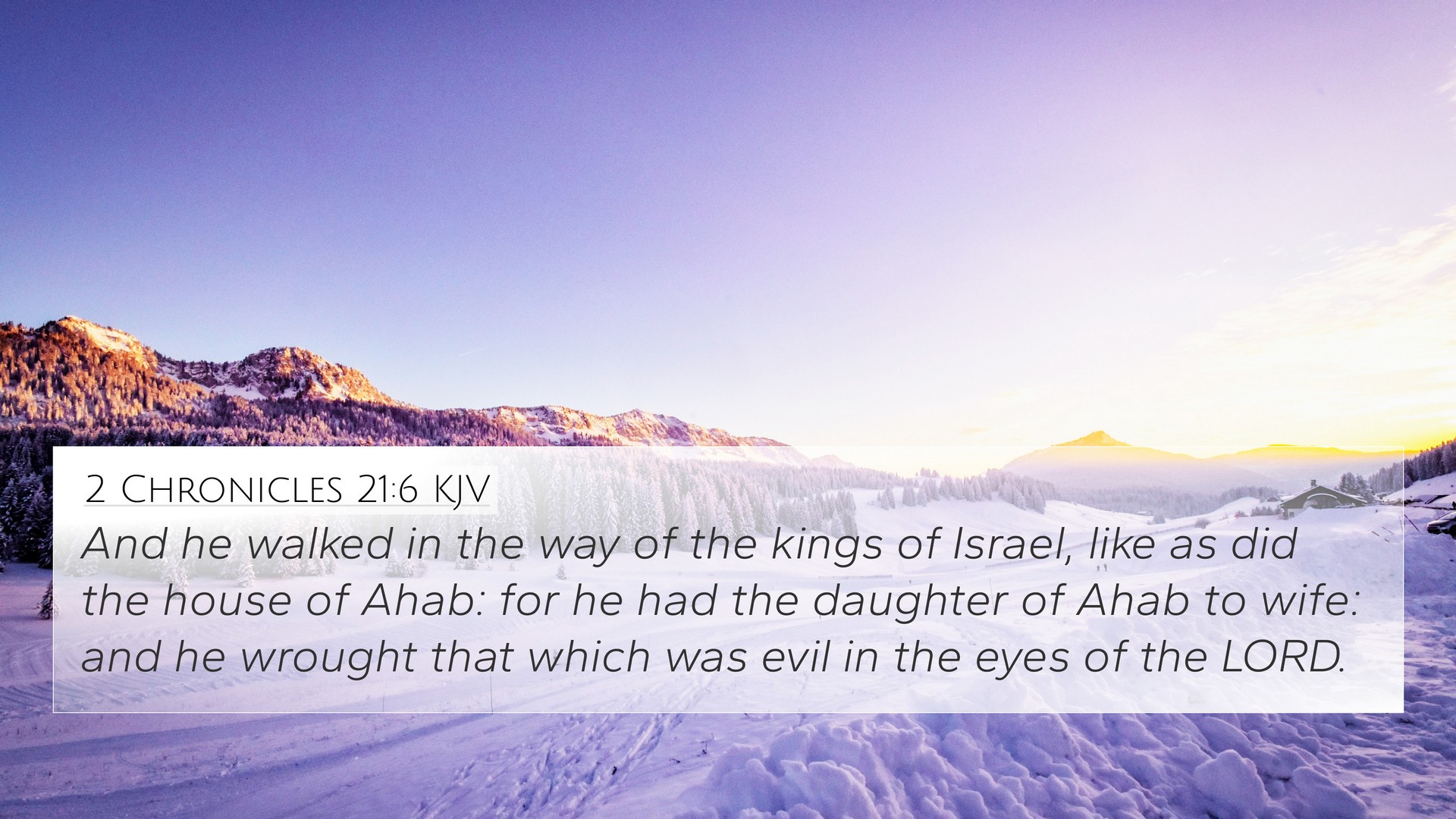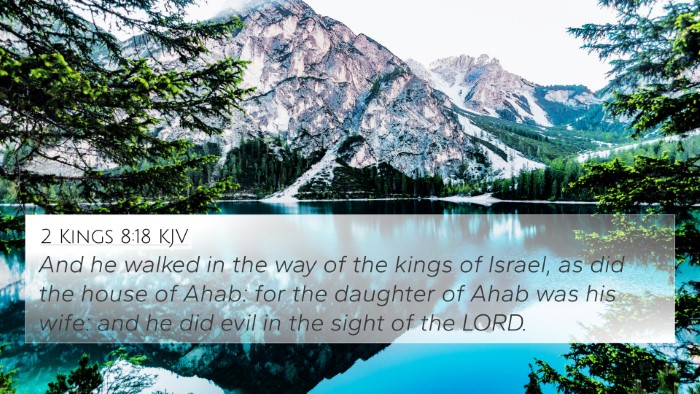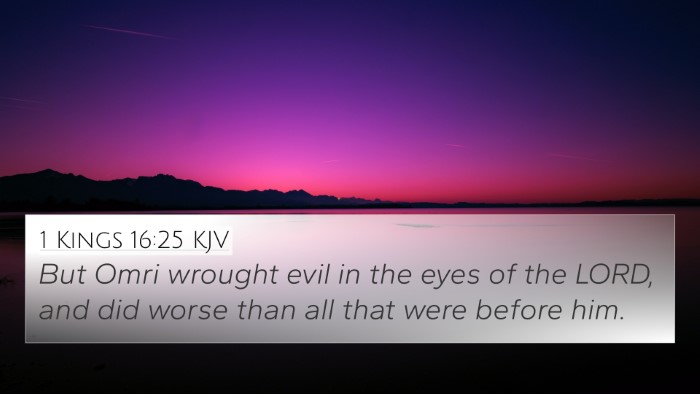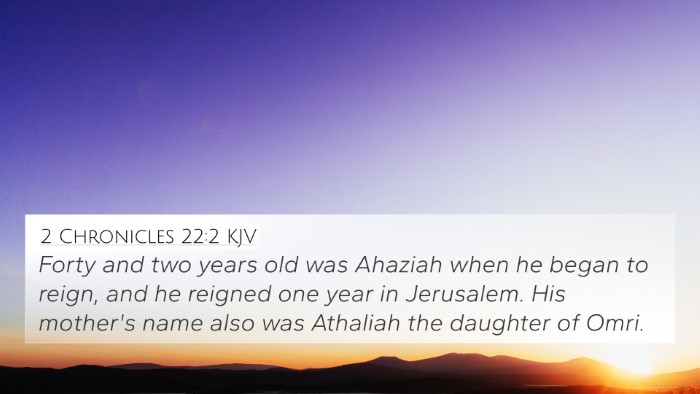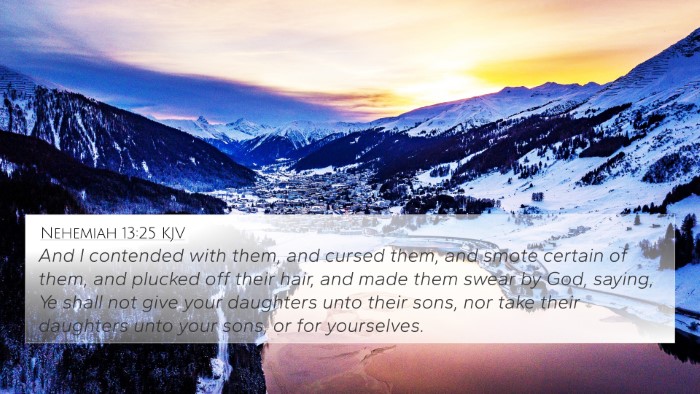Bible Verse: 2 Chronicles 21:6
This verse states, "And he walked in the way of the kings of Israel, like as did the house of Ahab: for he had the daughter of Ahab to wife: and he did evil in the sight of the Lord." It describes King Jehoram of Judah and his alignment with the ways of the wicked kings of Israel.
Meaning and Interpretation
This verse outlines the tragic consequences of Jehoram's decisions, influenced heavily by his marriage to Athaliah, the daughter of Ahab. His actions are characterized by:
- Following a Corrupt Lineage: Jehoram’s choice to marry into Ahab’s family significantly influenced his reign. Both Matthew Henry and Adam Clarke emphasize that his decisions were shaped by the evil practices of Ahab and Jezebel.
- Wickedness in Leadership: His actions serve as a warning against aligning with those who pursue ungodly paths. Albert Barnes notes that the way of the kings of Israel was marked by idolatry and moral corruption.
- Divine Judgment: The phrase "he did evil in the sight of the Lord" is a recurring theme in Scripture that signifies God’s perspective on human actions. This indicates a serious deviation from what is expected of a king of Judah.
Bible Cross-References
This verse resonates with several other parts of Scripture that reflect similar themes of disobedience, divine judgment, and the importance of righteous leadership:
- 1 Kings 16:30-33: Details the evil ways of Ahab, providing context for Jehoram’s actions.
- 2 Kings 8:16-19: Describes how Jehoram’s lineage is intertwined with the house of Ahab, elaborating on his wicked reign.
- 1 Chronicles 22:10: Prophecies that God would establish David’s house, contrasting Jehoram's leadership.
- Proverbs 14:34: Highlights that righteousness exalts a nation, implying Jehoram’s failure as a ruler.
- Jeremiah 22:1-5: Offers prophetic warnings to the descendants of David regarding their actions and their consequences.
- Ephesians 5:11: Encourages believers to avoid unfruitful works of darkness, paralleling Jehoram’s association with evil.
- Revelation 3:15-16: God’s disdain for lukewarmness can be seen as reflective of Jehoram’s sinful choices.
- 2 Chronicles 28:1-4: Another example of a king whose evil ways brought destruction upon his kingdom.
- Matthew 15:14: Jesus warns against blind leaders, correlating to Jehoram's spiritual blindness.
- James 1:15: Delineates the progression of sin leading to death, mimicking Jehoram’s trajectory as a leader.
Thematic Connections
The connections between these verses stress the themes of:
- **Idolatry and Spiritual Blindness:** Jehoram’s decisions reflect a greater principle found throughout Scripture regarding the dangers of leading with a heart distant from God.
- **Consequences of Sin:** Numerous passages emphasize that unrighteousness leads to divine punishment, a thread weaving throughout the historical narratives of the kings.
- **Influence of Relationships:** The impact of alliances, particularly in marriage, is a recurring biblical concept that can lead a leader astray.
Conclusion
In examining 2 Chronicles 21:6 in conjunction with these cross-references, we are drawn to a deeper understanding of how Jehoram’s choices mirror the broader biblical themes of leadership, influence, and divine accountability. Tools for Bible cross-referencing and thorough study methods enhance our ability to grasp these complex interconnections, providing a richer comprehension of scripture as we consider the implications of Jehoram's reign and its lessons for us today.
